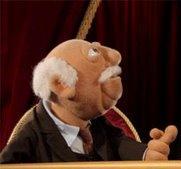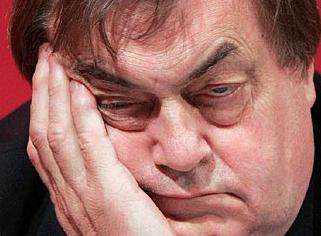I haven't previously blogged about the row over grammar schools, both because of heavy time commitments but also because I seem to be one of the few people in the Conservative Party who doesn't feel stirred on the issue. That said, I suspect that
some of the backlash is more an anti-Cameron backlash that's been awaiting an issue rather than a specific crusade in favour of grammar schools.
Plus as so many have pointed out this is exactly the same policy the Conservatives followed in government for at least thirty years. But of course Margaret Thatcher and John Major didn't have to cope with the blogosphere.
State schooling is one of the issues I feel least well qualified to talk about because of my own schooling. (Okay technically for a time I attended a local authority run inner city school but it was a very unique set-up.) That said, I do get very annoyed with the way people who were sent to private schools get dismissed. Nobody at that age makes the state/private choice for themselves. Who at the age of 1 (I'm serious - that's when many people go onto the waiting lists for certain private schools!) gets up and demands that they be sent to a state school because of the effect it might have on a political career thirty-five years later?
What I do have experience of though are some of the effects that selective schooling can have, both on the pupils and parents. And there are some points that I don't see raised very much in the whole debate.
For example at the age of 6 I sat an exam that determined whether or not I got into a particular school. I passed the exam. However my then best friend (and next door neighbour) did not and consequently went to a different school. "What ifs" are always highly speculative, but I do occasionally wonder if my time at prep school would have been different for the better if we had both passed the exam.
When I did transfer from preprep to prep school there were, from recollection, only about four or five other pupils who made the same move and by the time I reached the sixth year there was only one other still there. (And throwing in the strange practice of my preprep school in having pupils move up term by term albeit sometimes staying in the same form and sometimes skipping terms - a
very complicated system to explain - and there was not one person who I was always in the same form/"year" as throughout my early schooling days.) Some of this was because my preprep was mixed and my prep school single sex (although now it is fully mixed) but even so it seems a world away from others who talk of lifelong friends who were always there throughout their entire school days. When I moved on to the next school at the age of 13 there was again only one other pupil who made an identical transfer.
Additionally with one exception all the schools I attended were miles from my home - my prep school was by road 4.4 miles away, which at the age of 7-12 does feel a lot, and was also out of town - most public transport options were unviable (there's no train station at all near the school that's safely walkable for anyone that age). And it took pupils from all over - my classmates came from variously Epsom, Leatherhead, Bookham, Esher, Reigate, Redhill, Oxted and numerous other towns and villages across eastern Surrey.
Now one could ask whether any of this matters. Does it make a difference if a child goes to a local school, has classmates who they can easily meet outside of school and has a shared experience with others for many years? Or does it make no difference if they go to a school some distance away, have classmates scattered across a county that is not easy to traverse without parental support and have a very limited total "shared experience"? And just what difference - academic results? Social skills? Social life? Is this measurable?
This does open up one of the urban/rural biases that come up - in metropolitan areas the distance and transport factors are invariably smaller. But it's hard to deny that any form of selection between schools (whether by schools or by parents) widens the area in which the pupils come from.
Then there was the transfer at 13. (One of the reasons why the private and state sectors often feel so alien from each other and don't seem to have much mixing may well be because they aren't terribly compatible for natural switchovers. Indeed I can't remember anyone joining my schools from a state school, whilst almost all of the admittedly small handful who transferred the other way left at odd points, presumably because of the recession biting hard.) From the age of 10 - half my time at prep school - it seemed as though almost everything was being run for the sake of the Common Entrance and scholarship exams - the private sector's own "12+/13+". *
(* Is the 11+ taken in the year when the pupil is 11/12 or is it referring to the subsequent school year when they start their new school? One area where I've never been too sure about is the terminology for the different years in schools, since all the ones I went to used different names. One school had only five year groups yet somehow managed to have two "6th forms". Additionally because my birthday is in August I've always tended to associate each school year with an exact age as the best common standard but this isn't always the age normally associated with what happens in that year - for instance I took my GCSE exams when I was 15 whereas most talk about "16" as the age for taking them. To complicate matters yet further I believe the local state schools in Surrey had different age transfers from the norm when I was growing up, but I can't be sure why I recall this. Terms like "Year Ten" are utterly meaningless to me.)
The scholarships for the 13+ private schools and the public schools (and the two are not interchangeable terms) may also be similar in terms of the bias in results. Whilst this is no scientific study, my recollection is that there was a small but noticeable difference in wealth both at my prep school (the senior school years were divided into two forms of pupils being prepared for Common Entrance and one form being prepared for the school's own exams for scholarships) and in my brief time at a public school. All too often it seemed that scholarships were regarded by parents and schools as badges of honour, rather than a way to alleviate high fees and allow people from less well off backgrounds to go to schools. The public school seemed to treat pupils who got scholarships as superior to others and granting them extra privileges, sometimes in pointless matters like which staircases they could use (though in fairness to the boys who got them I don't remember many letting it go to their heads). In no way were the scholarships being used as a means of widening participation. If anything was breaking down the
class basis of the schools, and I stress class not "socio economic group", it was wider changes in society and wealth generation. One can only guess as to whether
nouveau riche parents see sending their children to private and public schools as a social statement.
For reasons I won't go into now, I had an expected further transfer of school, which whilst undoubtedly being one of the best things that ever happened to me was also at a very awkward juncture for changing schools. Much of my schooling career was set in cycles of preparation for various exams - "12+/13+" at 10-12; GCSEs at 14-15; A-Levels at 16-17. It's one thing to move pupils between forms and sets within a school but a very different thing to transfer them between schools, especially when they're locked into such cycles. (Plus schools rarely have the places to sustain such transfers.)
This comes back to the problem that choice is limited in education at both parent and school end. "Shopping around" is near impossible and so schools ultimately recruit on the basis of their reputation, whether formalised in league tables or informalised by word of mouth. Diversity of provision is all well and good, but ultimately is academic selection really the best way of delivering everything that schools aim to provide? And does selection really operate in a wealth blind manner? Most evidence suggests to the contrary.










